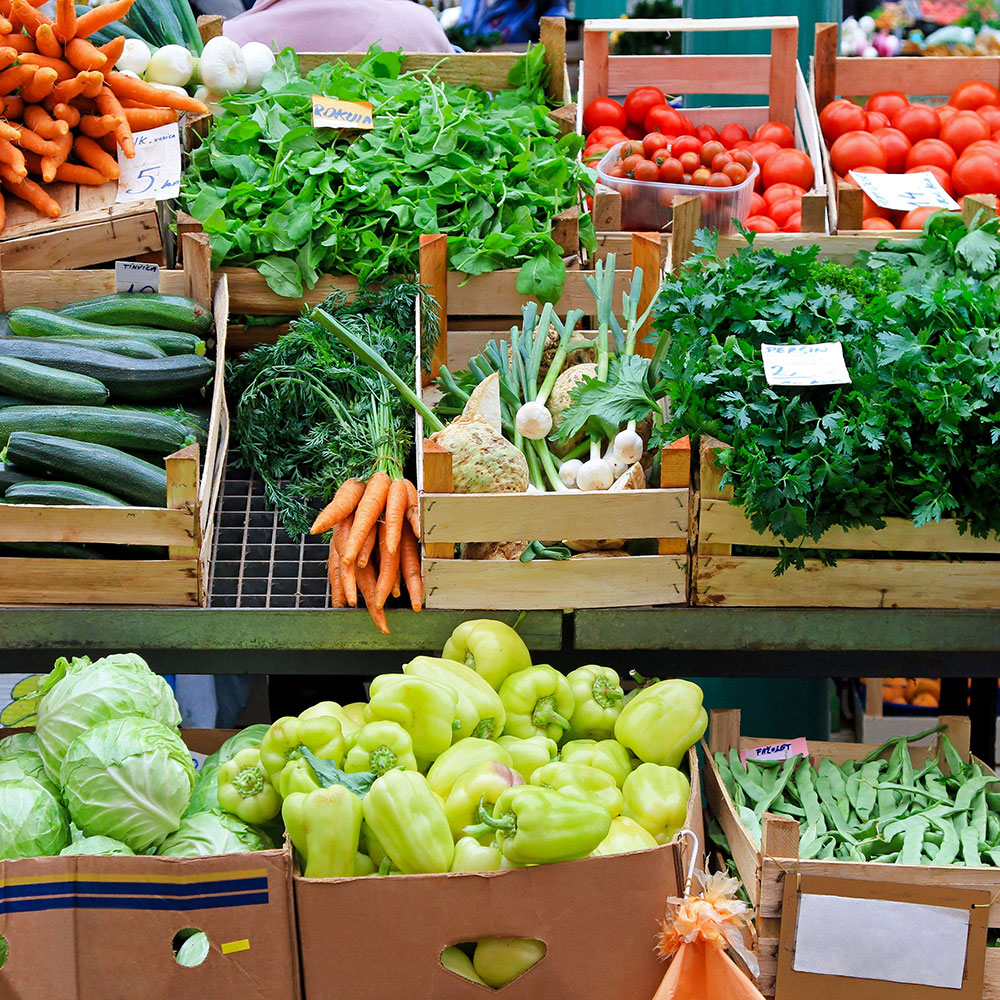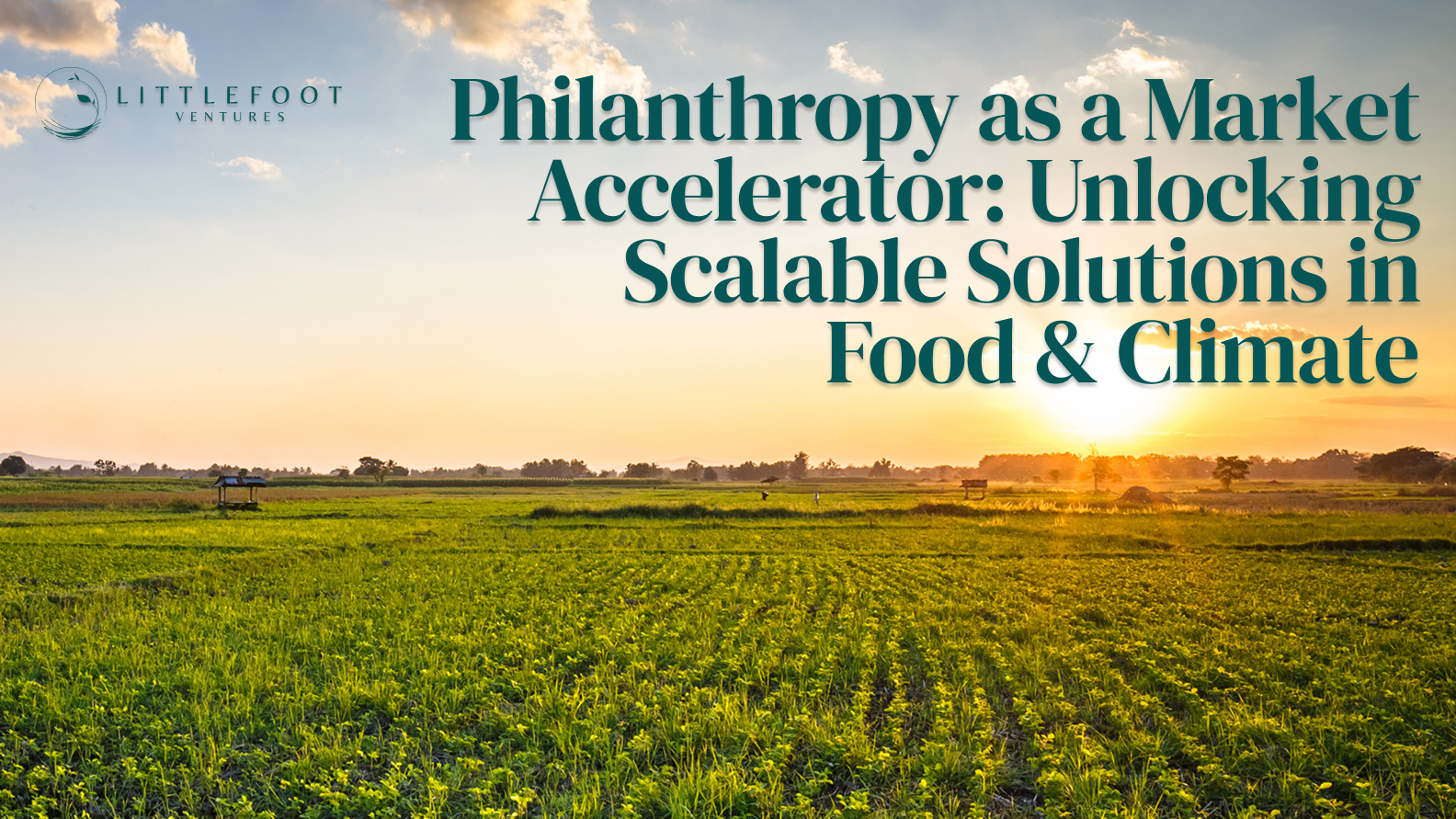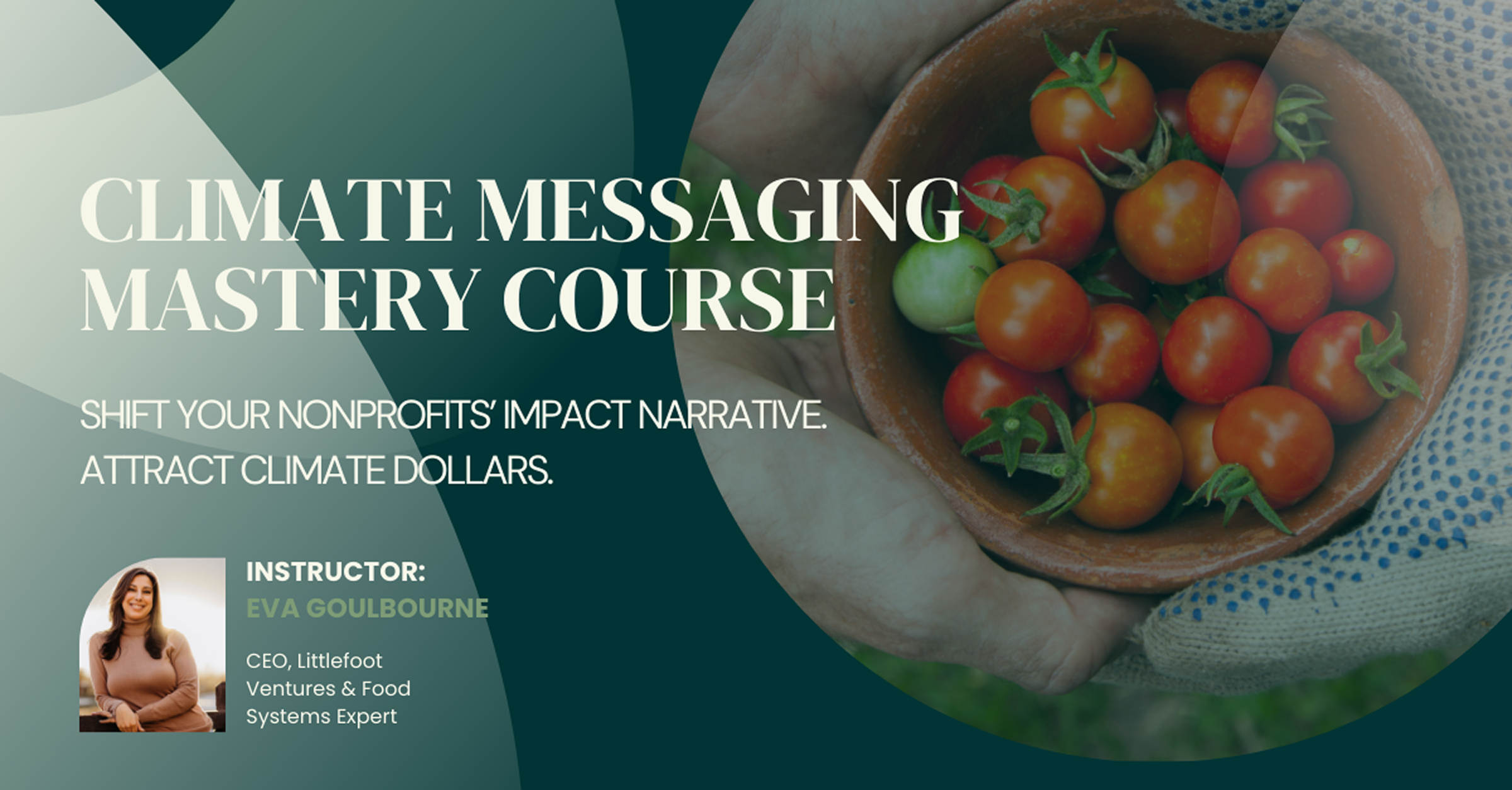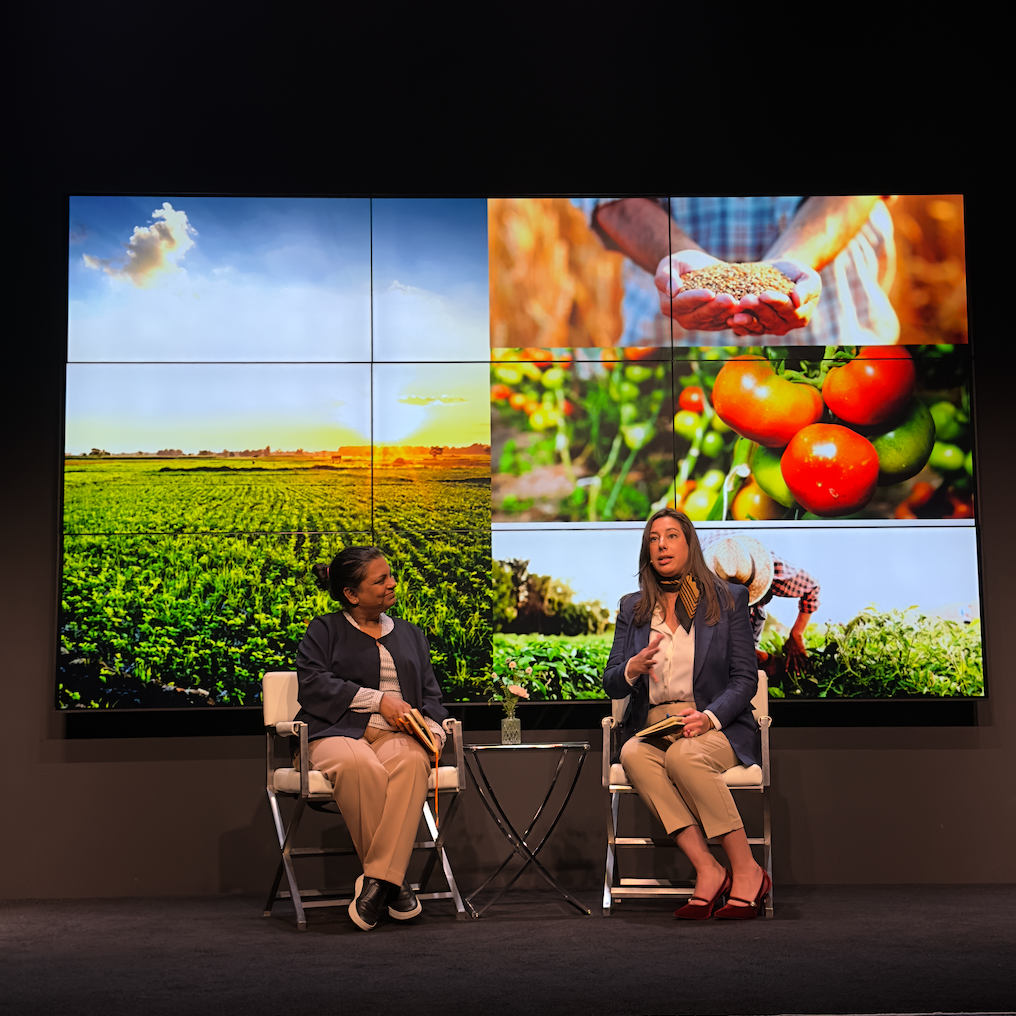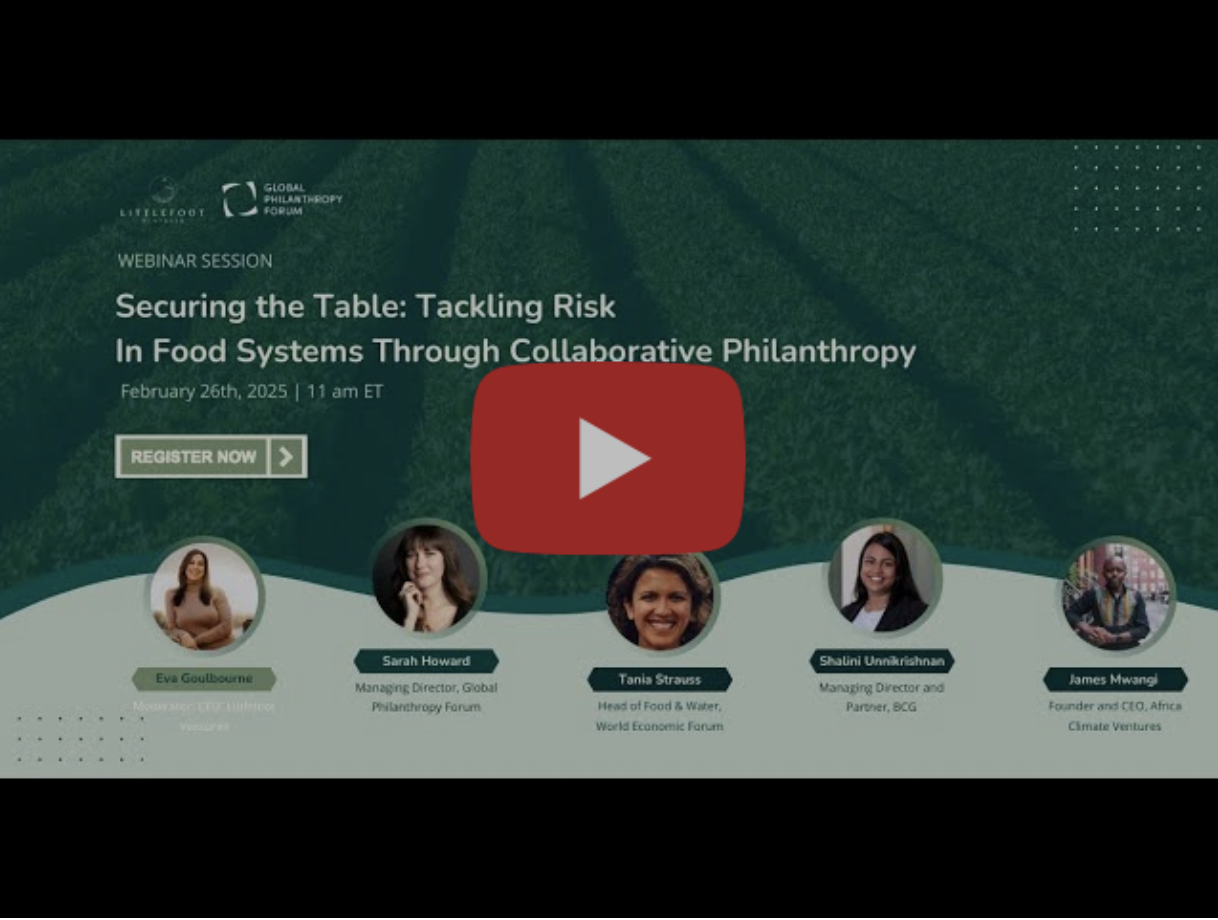Dear Colleagues,
Last week, I had the privilege of leading the first-ever food systems track at the Global Philanthropy Forum Leaders Summit. This experience underscored both the urgency and the immense opportunity to transform food systems as a key lever for food security, climate resilience, and economic sustainability.
One key takeaway: food systems and climate action are deeply linked, yet remain siloed in funding and strategy. While billions flow into climate action, food systems—responsible for one-third of global emissions—receive less than 5% of philanthropic climate funding. To meet global climate goals, we must transform how we grow, distribute, and consume food.
Themes That Emerged:
- Closing the Food & Climate Funding Gap – Food systems transformation is essential to achieving climate goals, yet it remains underfunded. We must make a stronger case for directing philanthropic capital toward high-impact food systems solutions.
- Aligning Food Systems with Existing Funder Priorities – Many funders already support conservation, disaster relief, and public health. By framing food systems as a solution to the challenges they already prioritize, we can drive more investment into this space.
- Philanthropy as a Catalyst for Market Transformation – Philanthropy has a unique role in de-risking early-stage innovations, unlocking private and public capital, and accelerating systemic solutions at scale.
- Three Priority Areas for Action – Scaling regenerative agriculture by investing in climate-smart farming to restore soil, cut emissions, and support farmer resilience; reducing food loss and waste and transforming supply chains by tackling inefficiencies, circular economy solutions, and emissions reductions; and advancing nutritional density and child nutrition by expanding access to nutrient-rich foods for long-term health and well-being.
These conversations reinforced a clear imperative: food systems must be at the center of climate solutions, not an afterthought. At Littlefoot Ventures, we are committed to mobilizing capital and accelerating high-impact strategies that drive meaningful food systems transformation. By aligning philanthropy, investment, and innovation, we can unlock the full potential of food as a climate solution and create a more resilient, equitable, and sustainable future for all. Now is the time to act.
Eva Goulbourne
Founder & CEO, Littlefoot Ventures
Unlock the Power of Climate Messaging
The climate crisis is reshaping the funding landscape—and with government grant uncertainty on the rise, the urgency to diversify funding has never been greater.
With donors increasingly prioritizing sustainability and climate action, nonprofits that can clearly articulate their impact will be best positioned to secure a share of the $4.8 billion in annual climate-focused philanthropic funding.
In 2024, Littlefoot Ventures presented the Climate Messaging Mastery Course live to 27 organizations across the USA, Latin America, Europe, East Africa, and Southeast Asia. Now, for the first time, we’re offering it on-demand—giving participants the flexibility to learn at their own pace, on their own schedule.
The course offers three subscription tiers, each designed to meet different learning needs and engagement levels. The Impact Accelerator tier includes four 1-on-1 strategy sessions with me for personalized guidance. If you’re interested, you can enroll directly or sponsor your grantees to participate.
For any questions, feel free to reach out at info@littlefootventures.com.
The Pulse @ Littlefoot Ventures
Philanthropy as a Market Accelerator: Unlocking Scalable Solutions in Food, Climate, and Land Restoration
At the GPF Leaders Summit, I hosted a fireside chat with Shalini Unnikrishnan (BCG) on how philanthropy can accelerate regenerative agriculture at scale. The challenge is that agriculture drives 30% of global emissions yet regenerative farming isn’t scaling fast enough. The solution is de-risking investment through philanthropy, aligning economic incentives for market adoption, and scaling impact through public-private collaboration. A powerful example of how strategic philanthropy can unlock scalable, market-driven solutions is BCG’s regenerative initiative in Brazil’s Cerrado, working with the government to protect 43M hectares, cut 140 MTCO₂E, and boost farmer livelihoods. To learn more about the COP28 Action Agenda on Regenerative Landscapes (AARL) initiative, which Littlefoot Ventures advised BCG on, click here.
Reflections from TomKat Ranch Educational Foundation
Through the food systems track at the Global Philanthropy Forum Leaders Summit, we organized a field trip to TomKat Ranch Educational Foundation. Seeing regenerative practices in action underscored the potential of healthy soils, increased biodiversity, carbon sequestration, and more resilient food systems. But despite its promise, regenerative agriculture is not scaling fast enough. Philanthropy has a critical role to play—as it can de-risk investment and address the $12 trillion cost of inaction on regenerative agriculture.
Securing the Table: Tackling Risk in Food Systems through Collaborative Philanthropy Webinar
Littlefoot Ventures, in collaboration with the Global Philanthropy Forum, hosted a webinar tailored for funders and foundations seeking to drive impact in food systems. This powerful discussion featuring food system thought leaders explored how philanthropy and collaboration can reduce risk in our food systems by addressing food and climate financing gaps. The urgency is clear: philanthropic capital can be catalytic—bringing stakeholders together, de-risking investment, and unlocking large-scale transformation.
Harnessing Carbon Finance to Scale Food Rescue & Waste Reduction Webinar
Food waste drives 8-10% of global emissions, yet remains an overlooked climate challenge. Scaling food rescue requires innovative funding, and carbon finance is proving to be a game-changer. In a panel I moderated, experts explored how corporate partnerships and carbon markets can fund food rescue, shared real-world success stories, and discussed the biggest challenges and opportunities in making this model work.
Insights for Impact: Our Top Reads
Sustainability in an Unstable World
Project Syndicate
As geopolitical tensions and economic pressures rise, some companies are quietly downplaying their sustainability commitments—a trend known as greenhushing. But treating climate action as a competing priority rather than an integrated necessity could prove disastrous. This feature explores how sustainability, security, and economic resilience are deeply intertwined. Instead of retreating, businesses must embrace a bold, strategic approach that aligns sustainability with long-term value creation.
Slim margins, climate disasters, and Trump’s funding freeze: Life or death for many US farms
Grist
Farmers across the U.S. are struggling to stay afloat as the Trump administration’s USDA funding freeze leaves critical conservation grants, disaster aid, and sustainable agriculture programs in limbo. Small farmers, beekeepers, and food hubs report mounting debt, halted operations, and supply chain disruptions, with many questioning whether they can survive without federal support. While the USDA has released small amounts of aid, billions in promised funds remain blocked, particularly for programs supporting climate-smart farming and diverse agricultural operations. With climate disasters and slim margins already squeezing farmers, advocates warn that these cuts could accelerate farm closures, land consolidation, and rising agricultural emissions.
From Better Breeding to Cow-Burp Vaccines, Emerging Solutions Could Curb Agricultural Emissions
World Resources Institute
Methane is a potent greenhouse gas, and nearly half of global methane emissions come from agriculture. With food demand rising, emissions are set to grow—unless new solutions take hold. A new WRI report highlights emerging strategies, from methane-inhibiting feed additives to breeding lower-emission cows and even developing anti-methane vaccines. While promising, these solutions require investment, policy support, and farmer adoption to scale effectively. By integrating innovation with agricultural practices, we can reduce emissions while maintaining food security.
MacArthur Foundation to increase giving for two years in response to ‘crisis’
AP News
The MacArthur Foundation will raise its annual grantmaking from 5% to at least 6% of its endowment over the next two years, committing an additional $150 million to counter the impact of the Trump administration’s freeze on foreign aid and federal grants. The foundation’s president, John Palfrey, called on other philanthropies to follow suit, emphasizing that nonprofits face a severe funding shortfall. The Freedom Together Foundation also announced a doubling of its grantmaking in response to the crisis.
Navigating the New Climate Era: Building Intuition for Strategic Decision-Making
J.P. Morgan
This thought leadership series is designed to help leaders develop climate intuition—the ability to assess future climate risks, anticipate shifts in technology and policy, and understand how geopolitical and economic forces shape financial outcomes. Drawing from experience in science, policy, finance, and national security, this bridges the gap between research and real-world application. From extreme weather disruptions to regulatory shifts and market dynamics, climate change presents both risks and opportunities. Success in the New Climate Era will depend on integrating climate considerations into daily decision-making—those who adapt will lead, while others risk falling behind.
Five Good News Stories to Kick Off 2025
ReFED
Early 2025 has seen major strides in food waste reduction, from Walmart selling compost made from its own food waste to Divert processing 630 million pounds of unsold food into renewable energy. Starbucks joined the U.S. Food Waste Pact, while Phoenix launched the nation’s largest municipal food recycling program. Meanwhile, Flashfood and Loblaw saved customers $50 million and diverted 86 million pounds of food from landfills—proving that progress is happening across industries.
Our food, land and water crises are interconnected. Philanthropy’s approach should be too.
Alliance Magazine
The global land squeeze—driven by rising demand for food, fuel, and conservation—exacerbates climate change, biodiversity loss, and social inequities. Traditional siloed philanthropy fails to address these interconnected crises. Instead, a systems approach is needed to balance food production, ecosystem protection, waste reduction, and land restoration. The Produce-Protect-Reduce-Restore (PPRR) framework, developed by the World Resources Institute (WRI), offers a holistic strategy to navigate trade-offs and drive sustainable impact. Philanthropy must embrace complexity, fund integrated solutions, and support governance reforms to ensure a resilient and equitable future.
Small Farms and Food Banks are Caught Off Guard by Spending Cuts
New York Times
The Trump administration’s USDA has eliminated two key food programs, which helped small farms supply fresh food to schools and low-income families. Farmers, food hubs, and food banks are now facing financial uncertainty, with many forced to scale back operations or stop working with local producers altogether. While the administration claims the cuts are a return to “fiscally responsible initiatives,” critics argue they undermine local food systems and limit access to healthy food for vulnerable communities.
TED Explores: Food for the Future
TED
This case study on Fresh Del Monte highlights how sustainability and profitability can go hand in hand. The company tackled food waste head-on by improving its supply chain efficiency and embracing technology. By focusing on better forecasting, inventory management, and waste tracking, Del Monte reduced waste, saved money, and helped drive sustainability in the fresh produce sector, revealing that innovative approaches taken by big food companies can make a significant impact on reducing food waste while boosting their bottom line.
Events
- Apr 7-13 | Webinars | Food Waste Prevention Week 2025
- Apr 19-27 | San Francisco, CA | SF Climate Week
- May 5-8 | Las Vegas, NV | WasteExpo Food Recovery Forum and Organics Recycling Conference
- June 16-17 | Chicago, IL | The WSJ Global Food Forum
- Jun 23-25 | Seattle, WA | ReFED Food Waste Solutions Summit
- Nov 19-20 | Anaheim, CA | Sustainable Agriculture Summit
